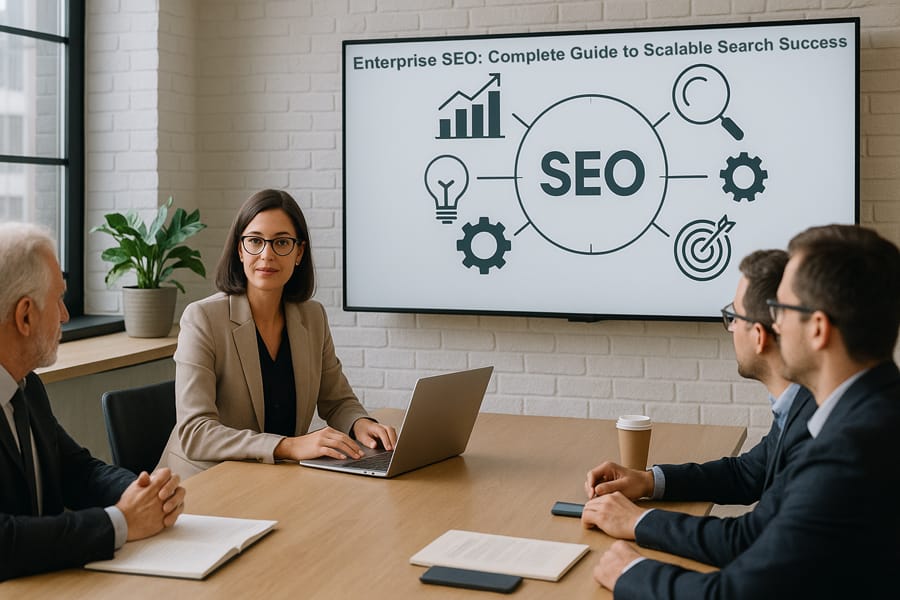Table of Contents
Enterprise SEO: A Comprehensive Guide to Scalable Search Success for Large Organizations
In the dynamic world of digital marketing, where organic visibility is the lifeblood of online presence, Enterprise SEO stands in a league of its own. Unlike optimizing a small business website, Enterprise SEO involves navigating the complex architecture, sheer volume, and intricate governance of large organizations.
This guide provides a deep dive into the strategies, challenges, and future trends essential for mastering enterprise-level search engine optimization. We’ll explore how large organizations can achieve sustainable, scalable search success across millions of pages, driving significant organic growth and market dominance.
1. Understanding the Enterprise SEO Landscape
Enterprise SEO is not merely SEO “scaled up.” It’s a fundamentally different discipline that requires a unique blend of technical expertise, strategic foresight, and organizational alignment.
The Scale and Complexity
When we talk about enterprise websites, we are typically referring to sites with:
10,000+ pages: Often reaching into the millions for e-commerce or large media publishers.
Multiple Domains and Subdomains: Managing different brands, regions, or product lines.
Legacy Systems and “Tech Debt”: Older infrastructures that complicate modern SEO implementation.
International Presence: Navigating multilingual and multiregional SEO complexities (hreflang, localized content).
The “Enterprise Gap”: Traditional vs. Enterprise SEO
The core difference lies in the approach. While traditional SEO often focuses on quick wins and manual optimizations, enterprise SEO demands automated processes, robust governance, and long-term planning.
Feature | Traditional SEO (SMB/Mid-Market) | Enterprise SEO (Large Organizations) |
Website Size | Hundreds to thousands of pages | Tens of thousands to millions of pages |
Complexity | Relatively simple architecture | Highly complex, multi-layered systems |
Keyword Focus | Niche, localized, long-tail | Broad, competitive terms + long-tail at scale |
Execution | Manual optimization, quick fixes | Automation, programmatic SEO, and large-scale implementation |
Stakeholders | Few (Owner, Marketing Manager) | Many (IT, Dev, Product, PR, Legal, Executives) |
Measurement | Traffic, basic rankings | ROI, revenue, market share, executive reporting |
2. Navigating the Unique Challenges of Enterprise SEO
The sheer scale of enterprise websites introduces specific hurdles that can derail even the most experienced SEO professional. Recognizing and addressing these challenges is the first step toward scalable success.
2.1. The Technical Maze 🕸️
Technical SEO forms the backbone of any enterprise strategy. With millions of pages, seemingly minor technical issues can lead to massive losses in visibility.
Crawl Budget Optimization: Ensuring search engine bots prioritize high-value pages and don’t waste time on duplicate or low-quality content. Enterprise sites often struggle with inefficient crawl paths.
Site Architecture and Internal Linking: Creating a logical, scalable site structure that supports user navigation and distributes link equity effectively.
Legacy Systems and Implementation Speed: Large organizations often have bureaucratic processes and outdated technology, making implementing essential SEO changes (like redirects or schema markup) slow and difficult.
Duplicate Content and Faceted Navigation: E-commerce sites, in particular, face challenges with filters and product variations creating thousands of duplicate URLs that dilute SEO efforts.
2.2. Organizational Silos and Buy-In
In large enterprises, different departments often operate independently (in silos), which can hinder SEO progress.
Lack of Communication: Content teams might create new pages without technical SEO guidance, or development teams might push updates that break canonicalization.
Securing Executive Buy-In: Demonstrating the value of SEO in terms of revenue, not just rankings, is crucial for gaining resources and prioritization from C-suite executives.
Competing Priorities: SEO recommendations often compete with product development, IT security, and other departmental goals.
2.3. Data Management and Attribution
Collecting, analyzing, and acting on data at an enterprise scale is complex.
Data Overload: Managing vast amounts of data from multiple sources (analytics, GSC, CRM, etc.) can be overwhelming.
Attribution Challenges: Accurately attributing organic traffic to specific revenue streams across diverse business units.
Tooling and Infrastructure: Enterprise-level SEO tools are expensive and require specialized knowledge, but they are essential for managing scale.
3. Strategic Foundations for Scalable Enterprise SEO
A successful enterprise SEO strategy requires a holistic approach that integrates technical, content, and authority-building efforts.
3.1. Technical SEO at Scale: The Non-Negotiable Foundation
For enterprises, technical SEO is the most critical element because it dictates whether search engines can effectively crawl, index, and understand the site.
Robust Site Architecture: Implement a flat, organized structure that ensures key pages are only a few clicks from the homepage.
Schema Markup and Structured Data: Utilize advanced structured data to help search engines understand the content, especially for products, reviews, and corporate information.
Core Web Vitals and Page Speed: Large sites often struggle with performance. Prioritize optimizing Core Web Vitals to provide a superior user experience, which is increasingly vital for ranking.
Log File Analysis: Regularly analyze server logs to understand how Googlebot is interacting with the site and identify crawl budget inefficiencies.
3.2. Content Strategy for Market Dominance
Enterprise content must be high-quality, relevant, and scalable. The goal is to establish topical authority across broad, competitive themes.
Topic Clusters and Pillar Pages: Organize content around comprehensive “pillar pages” that cover core topics, supported by detailed “cluster content.” This approach strengthens internal linking and demonstrates deep expertise.
E-E-A-T Optimization: For large brands, demonstrating Experience, Expertise, Authoritativeness, and Trustworthiness is paramount. This involves showcasing authors’ credentials, providing transparent company information, and focusing on data accuracy.
Content Governance and Auditing: Implement clear processes for content creation, publication, and auditing. Regularly audit existing content to consolidate, update, or remove low-value pages that drain crawl budget.
3.3. Authority and Link Building at Scale
Enterprise link building focuses on acquiring high-quality, authoritative backlinks that reflect brand trust and relevance.
Digital PR and Partnerships: Leverage the brand’s reputation to secure high-profile mentions and links from reputable news outlets, industry leaders, and strategic partners.
Content-Driven Link Acquisition: Create comprehensive studies, unique data visualizations, and industry reports that naturally attract backlinks.
Internal Linking Optimization: Don’t underestimate the power of internal links. Implement a strategic internal linking framework that passes authority to key conversion pages.
4. Collaboration, Communication, and Governance: The Human Element of Enterprise SEO
In a large organization, SEO success often depends less on technical skills and more on the ability to collaborate and communicate effectively across departments.
4.1. Building Bridges Between Silos
SEO impacts every corner of an organization, from IT and development to marketing, PR, and legal. Effective collaboration requires a shift in mindset and a clear communication strategy.
Educate Stakeholders: Help non-SEO teams understand the why behind SEO initiatives. Translate technical jargon into business value. For example, explain how a faster website (technical SEO) leads to lower bounce rates and higher conversion rates (business goals).
Establish a “Center of Excellence” (CoE): Create a centralized team or framework that sets SEO standards, provides guidance, and ensures consistency across all business units and regions.
Cross-Functional Workshops: Host regular workshops involving SEO, development, and content teams to align goals and troubleshoot issues collaboratively.
4.2. Implementing a Robust SEO Governance Model
Governance provides the structure and processes needed to maintain SEO integrity across a complex organization.
Standardized Workflows: Define clear processes for content creation, technical deployments, and website updates.
Documentation and Training: Maintain comprehensive documentation of SEO best practices, algorithm updates, and internal guidelines. Regularly train teams across the organization.
Approval and Review Processes: Ensure that all major website changes (e.g., site migrations, new feature launches) are reviewed by the SEO team before implementation.
5. Future Trends in Enterprise SEO: Adapting to AI and Beyond
The SEO landscape is constantly evolving, driven primarily by advancements in AI and user behavior. Enterprise organizations must be agile and ready to adapt.
5.1. The Impact of Generative AI and AI Overviews
Google’s integration of Generative AI (like AI Overviews) is fundamentally changing how users interact with search results.
Zero-Click Searches: AI Overviews provide answers directly on the SERP, potentially reducing organic click-through rates (CTRs) for some queries.
Optimizing for Featured Snippets and AI Summaries: Enterprises need to optimize content not just for traditional rankings, but for inclusion in these AI-generated summaries by providing clear, concise, and authoritative answers.
Content Quality and E-E-A-T: As AI summarizes existing information, the emphasis on high-quality, unique, and trustworthy content (E-E-A-T) becomes even more critical.
5.2. Data Science and Predictive SEO
Enterprise SEO is becoming increasingly reliant on data science.
Predictive Analytics: Utilizing AI and machine learning to forecast SEO performance, identify untapped opportunities, and predict the impact of algorithm updates.
Advanced User Behavior Analysis: Moving beyond basic metrics (traffic, bounce rate) to understand complex user journeys and intent, optimizing for conversion-focused actions rather than just clicks.
5.3. Scaling International SEO
For global enterprises, managing multiple markets is a significant challenge.
Hreflang Implementation and Auditing: Ensuring correct implementation of hreflang tags to manage language and regional variations at scale.
Localized Content Strategy: Going beyond simple translation to create culturally relevant content that resonates with local audiences.
6. Enterprise SEO Next Steps: A Roadmap for Success
Mastering enterprise SEO is a long-term commitment. Here is a practical roadmap for implementing a scalable strategy:
Phase | Focus Areas | Key Activities |
Phase 1: Audit and Assessment | Understand the current state and identify critical issues. | Comprehensive technical SEO audit, competitive analysis, data infrastructure review, stakeholder interviews. |
Phase 2: Strategic Planning and Governance | Define goals, build a roadmap, and establish governance. | Develop a scalable content strategy, prioritize technical fixes, define KPIs aligned with business goals, and establish the SEO Center of Excellence. |
Phase 3: Implementation and Optimization | Execute the strategy and monitor performance. | Implement structured data, optimize Core Web Vitals, launch new content clusters, run targeted link-building campaigns, and automate reporting. |
Phase 4: Collaboration and Education | Integrate SEO across the organization. | Regular cross-departmental training, ongoing communication with IT/Dev teams, fosters a culture of SEO awareness. |
Phase 5: Future-Proofing and Adaptation | Stay ahead of trends and ensure long-term scalability. | Monitor AI trends, explore predictive analytics, continuously audit E-E-A-T, and refine international SEO efforts. |
🚀 Ready to Elevate Your Enterprise SEO?
Enterprise SEO success is about more than just rankings; it’s about building a robust, scalable digital foundation that drives sustained growth and market leadership.
The journey requires strategic planning, technical excellence, and the ability to navigate organizational complexity. By focusing on these core pillars, large organizations can unlock the full potential of organic search.
We are HITS Web SEO Write, your partners in scalable search success. If your enterprise is struggling to achieve sustainable organic growth, our team of experts can help you develop and implement a tailored, comprehensive SEO strategy.
Contact us today for a consultation and discover how we can transform your complex website into a powerful organic traffic engine.




